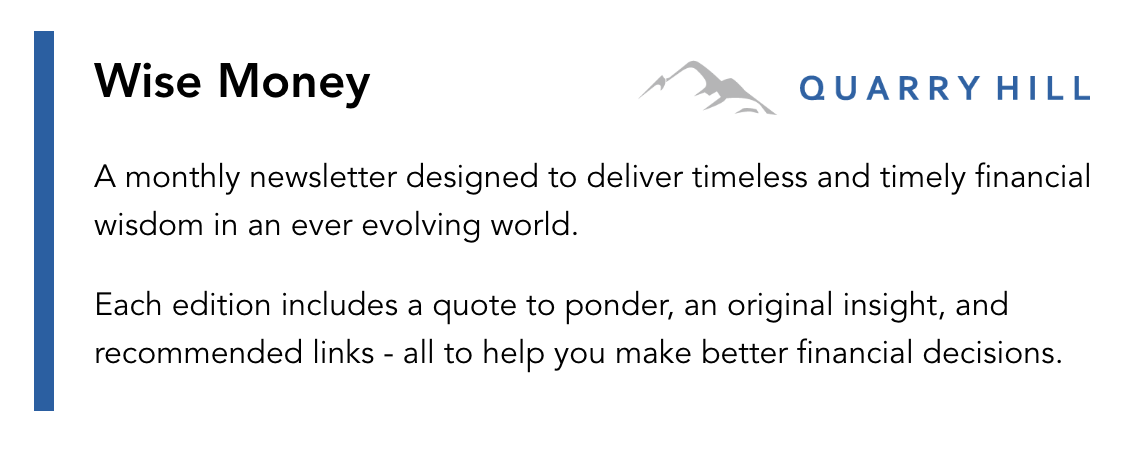

Quote to Ponder
“Not everything that can be counted counts, and not everything that counts can be counted.”
— William Bruce Cameron
Recommended Links
- The One Thing You Can Do for Your Kids - The Atlantic
- Where Value Investing Still Works - Financial Times
- Vanguard Nickels-and-Dimes Grandma after 49 Years - Yahoo
- Big Ticket Purchases People Regret - Wall Street Journal
- Avantis Growing Fast for All the Right Reasons - Yahoo Finance
- How I Think About Debt - Morgan Housel
Insight
In his thought-provoking book “Wild Problems: A Guide to the Decisions That Define Us,” Russ Roberts delves into the complex and often intangible challenges we face in life—challenges that defy a rational analysis or a pros/cons list. Wild problems are those life choices that cannot be easily quantified or solved through a simple cost-benefit analysis. These “wild problems” are not merely about optimizing for the best outcome in a predictable way; instead, they force us to consider the deeper aspects of our values, identities, and what truly makes life meaningful.
Examples include deciding whether to marry, choosing a career path, or determining whether to have children. These decisions often involve trade-offs that touch on our deepest values and priorities. Unlike everyday decisions, wild problems require us to think about who we are and who we want to become.
Everything looks like a nail to a person with a hammer, and everything looks like a financial decision to a financial planner. But, this last month, I (Bjorn) found my own wild problem that rendered my financial planning skills null and void- the idea of buying a new house. On the surface, this might seem like a straightforward financial decision, but it quickly becomes apparent that it’s much more complex.
If we decided to move, we would move to a nicer house that offers better hosting capabilities for friends and family and more access to nature. This new environment could enhance our quality of life in ways that are difficult to measure, providing a more beautiful and serene space to call home.
However, moving would also mean losing our current home’s immense benefits. We are currently within 1 mile of just about everything we love—family, work, school, church, and the gym—and this convenience contributes significantly to our daily happiness. The struggle we had decided this month was the choice between two visions of a beautiful life—a problem that defies my ability to quantify in a spreadsheet.
Roberts suggests several tools for tackling wild problems effectively.
Reflect Deeply on Your Values: Consider how each option aligns with your core values and the kind of person you want to become. This helps ensure that your decision reflects your deeper principles rather than just immediate benefits.
Gather Diverse Perspectives: Seek input from a variety of people who can offer different viewpoints. This can help you see aspects of the problem you might have overlooked and provide a broader understanding of potential outcomes.
Experiment and Iterate: Where possible, test your decisions on a smaller scale before fully committing. This allows you to experience different outcomes and adjust your course based on real-world feedback.
Visualize Different Outcomes: Imagine various scenarios and their impacts on your life. This helps you understand the broader consequences of each choice and how they align with your long-term goals.
Embrace Uncertainty: Accept that not all outcomes can be predicted or controlled. Learning to live with uncertainty can reduce anxiety and help you make decisions based on what feels most aligned with your values, rather than trying to predict every possible outcome.
Focus on Flourishing: Aim for decisions that promote overall flourishing rather than just immediate happiness or success. This involves considering how choices will affect your long-term well-being and growth.
Navigating wild problems is never easy, but through these challenging decisions, we ultimately define who we are and what we stand for.
This material is intended for educational purposes only. You should always consult a financial, tax, or legal professional familiar with your unique circumstances before making any financial decisions. Nothing contained in the material constitutes a recommendation for purchase or sale of any security, investment advisory services or tax advice. The information and opinions expressed in the linked articles are from third parties, and while they are deemed reliable, we cannot guarantee their accuracy.
